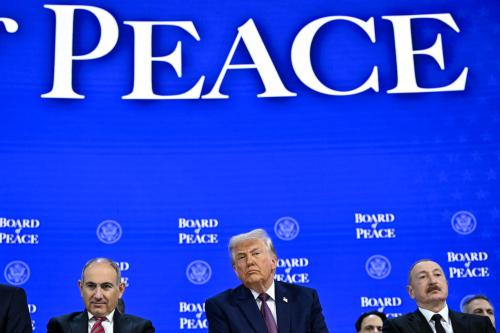Hearing the news that a majority of those involved in the London terrorist attacks were of Pakistani origin, and that some of them had recently visited his country, Pakistani President Pervez Musharraf, responded by blaming the British. Beyond that, he and the country’s diplomatic missions have begun targeting overseas critics, including the media, for fingering Pakistan.
Gen. Musharraf then proceeded to outline the steps that needed to be taken in Pakistan, and laid out a strategy—he called it “enlightened moderation”—that would eliminate the conditions that breed extremism and terrorism. This strategy would also restore Pakistan’s tattered reputation as a leading moderate, Islamic state. But Gen. Musharraf has given this speech before—in January of 2002, four months after 9/11, and on many other occasions—outlining the same solutions and actions to be taken. As with this latest version, the 2002 speech was also accompanied by raids against suspected Islamic extremists. Rounding up the usual suspects seems to be standard operating procedure.
Gen. Musharraf has come a long way, most of it downward, from the heady optimism surrounding the peaceful coup of late 1999 that brought him to power. At that time, democracy had been discredited in Pakistan, the economy was in a shambles, and sectarianism was raging. The country had just been caught out in an ill-planned military assault against India. And despite his role in that operation—he was then army chief—he was regarded as a moderate, progressive general. Yet, he and his fellow generals underestimated the task ahead. When advised shortly after the coup that he might want to turn the country over to the politicians after a cleansing election, he laughed, dismissing them as incompetents bent on ruining Pakistan.
Well, it turns out Gen. Musharraf has only proved the point that Pakistan’s army can neither effectively run Pakistan nor let anyone else try. While the economy is stable, poverty has grown, along with sectarianism. And Pakistan’s calculated support for terrorists and separatists has backfired badly. The past few years have witnessed another crisis with India, and Pakistan has been forced to abandon its Taliban ally in Afghanistan, and even permit U.S. military bases on its territory.
Does Gen. Musharraf still have the time to be less reactive and more proactive, and show the world that he means business? Probably not; his commitments to clamping down on the extremists in his own country are not borne out by action.
Not only is there doubt about Gen. Musharraf’s ability to deal with Islamic extremists (the other day, he said he hoped that Osama bin Laden was in Afghanistan rather than in Pakistan, so he would not be responsible for capturing him), there also are questions about Pakistan’s co-operation in revealing its clandestine support for the Iranian, Libyan, North Korean and other missile and nuclear programs. The rhetoric may be there, but the reality is that the U.S. has not seen full compliance on either the nuclear or the terrorism fronts.
Gen. Musharraf has convinced many in Washington that he cannot act more quickly, but signs that this argument no longer has the same resonance have recently emerged in statements by CIA director Porter Goss, who, without naming countries, made U.S. impatience evident. Secretary of State Condoleezza Rice was also reported to have conveyed a strong message on her last visit to Pakistan on the necessity for more progress on the democratic front, and there are indicators that Ms. Rice will not be as tolerant of Pakistan as her predecessor, Colin Powell.
Pakistan may be one of the few states that have achieved sustainable failure. But one cannot be comfortable with a nuclear-armed Pakistan driving at 80 miles an hour along the edge of disaster: If it wasn’t clear already, the latest terrorist attacks show that what happens in Lahore doesn’t stay in Lahore.
The onus for fighting terrorism is not just on one country but on many. In Gen. Musharraf’s case, this means moving from the normative discussion of what “should” be done to delivering on his promises.
While it won’t be easy, Gen. Musharraf is not powerless to act, and the feeble public response to his (seemingly) tougher policy would seem to indicate that the street power of the radical Islamists is no match for a determined Pakistani government. And it is time for him to act; both his people and his partners are losing patience with him, and he is now weak at home and abroad.
Pakistan’s foreign friends must use whatever leverage they have to ensure that Gen. Musharraf really moves down the road of reform, and follows through on ending sectarian violence, genuine reform of the educational system, rebuilding political parties and organizations, continuing economic reform and a rapprochement with India. Since the most powerful political party in Pakistan is now the military, the greatest leverage may come from countries, such as the United States, that supply Pakistan with its arms and training.
The recent nuclear deal between India and the United States might have made things a little harder for Gen. Musharraf. With the tangible benefits that India is accruing from its rekindled relationship with the U.S., the Pakistani leader will be at pains to explain to his army and his public what it is exactly that Pakistan is gaining from its continuing co-operation with America. Gen. Musharraf can make such gains, too, by finessing the issue the way the Indians have—by agreeing to limits on his own nuclear program, and stabilizing the South Asian nuclear arms race.
India also should play a role. If it rests on the success of its recent deals with the U.S. and decides that it doesn’t have to talk to Pakistan, Gen. Musharraf is going to be hard-pressed to continue to ask for restraint, especially from his military. It is in India’s interest to move forward on the peace process and, by doing so, strengthen Gen. Musharraf’s hand and give him some leverage in the fight against extremism. India must ask itself whether it wants to deal with the general it knows or the general it doesn’t.
Pakistanis feel under siege because of their religion and their country’s past policies. But putting much of the onus of responsibility on the West and the United States just dodges the question of what Pakistan’s role must be. As Gen. Musharraf himself said in his speech a few days ago, “actions speak louder than words,” and those actions need to be more than token gestures. They must reflect a consistent, comprehensive strategy of combatting Islamist extremism. And the reason he must do this is simple: It is in Pakistan’s interest as much as it is in the West’s.
The Brookings Institution is committed to quality, independence, and impact.
We are supported by a diverse array of funders. In line with our values and policies, each Brookings publication represents the sole views of its author(s).



Commentary
Op-edMusharraf’s Great Failure
July 27, 2005